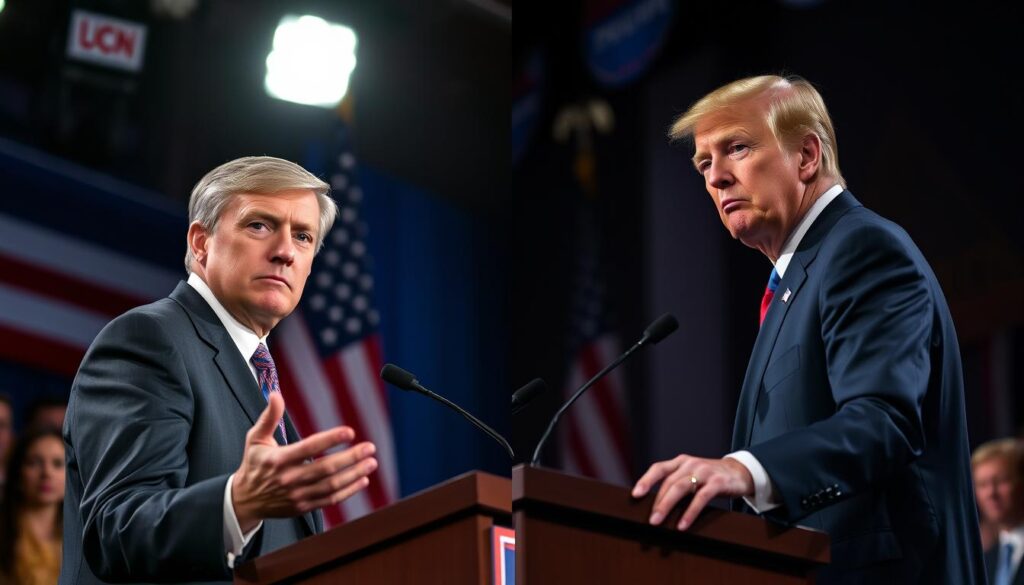The 2024 election season is in full swing, with the vice presidential debate between Tim Walz and JD Vance being a highlight on Tuesday night. This 90-minute event was a refreshing change from the aggressive presidential debates we’ve seen lately. Both candidates dove deep into policy discussions on key national issues.
After the debate, both sides claimed victory, reflecting the deeply divided political landscape. Fox News’ analysis showed that Republican viewers were largely pleased with Vance’s performance. They praised his explanation of his past criticism of former President Donald Trump. Yet, independent and Democratic viewers had mixed feelings. Some appreciated Walz’s stance on abortion rights, while others were skeptical of Vance’s evolving views on Trump.
Key Takeaways
- The vice presidential debate between Tim Walz and JD Vance featured substantive policy discussions on issues like immigration, abortion, and climate change.
- Republican viewers strongly approved of Vance’s performance, particularly his explanation of his previous criticism of former President Trump.
- Independent and Democratic viewers had more mixed reactions, with some approving of Walz’s defense of abortion rights and others questioning Vance’s shifting stance on Trump.
- Both campaigns claimed victory for their respective candidates, underscoring the divisive nature of the political landscape.
- The debate stood in contrast to the more combative nature of recent presidential debates.
Contrasting Reactions to Vance’s Explanation of His Shift on Trump
During the vice presidential debate, Vance addressed his previous criticism of former President Donald Trump. He acknowledged, “I was wrong about Donald Trump.” Vance explained that he had believed some “dishonest fabrications” about Trump’s record. However, he noted that Trump had ultimately “delivered for the American people” on issues like rising wages and border security.
Republican Support Surges as Vance Details His Change of Heart
The audience feedback data from Fox News’ Debate Dial system showed a surge in Republican approval rates. These rates soared past 80% and even over 90% during Vance’s explanation of his reversal on Trump. This overwhelming support from Republican viewers underscored the party’s continued embrace of the former president, despite Vance’s past criticism.
Democratic Viewers Express Discontent with Vance’s Reversal
In contrast, Democratic viewers expressed significant discontent with Vance’s change of heart on Trump. The Debate Dial data revealed that Democratic approval ratings bottomed out near 20% at one point during Vance’s explanation. This highlighted the deep partisan divide over the legacy of the former president and the Republican party’s relationship with him.
The sharply contrasting reactions from Republican and Democratic viewers illustrate the profound political polarization surrounding Trump’s influence within the GOP. Vance’s reversal on his previous criticism of the former president was embraced by his fellow Republicans. However, it met with strong disapproval from Democratic supporters.
Walz Defends Abortion Rights: “These are Women’s Decisions”
In the vice presidential debate, Tim Walz, the Democratic candidate, strongly advocated for abortion rights. He emphasized that “These are women’s decisions” and that access to abortion is a fundamental human right. Walz criticized Republican efforts to limit abortion, pointing to Amber Thurman’s tragic case. She died after a 20-hour wait for a routine procedure due to restrictive laws.
Walz believed that the decision to have an abortion is a personal choice. It should be made by the woman and her healthcare provider. He argued that women should have the autonomy to decide about their bodies and reproductive health without government interference.
“These are women’s decisions. Abortion access is a basic human right.”
Republican voters disapproved of Walz’s stance, but independent and Democratic viewers largely approved. This shows the political importance of abortion access. Walz’s defense of reproductive rights resonated with many, seen as a principled stance against increasing abortion restrictions.
Walz’s stance on abortion rights contrasted sharply with his opponent, JD Vance. Vance proposed a state-by-state approach to abortion regulation. Walz criticized this as an attempt to “erode” women’s access to essential healthcare services.
The debate on abortion rights exposed a significant divide between the two campaigns. Walz firmly defended a woman’s right to choose, while Vance sought to restrict abortion access. As the midterm elections draw near, the abortion rights debate will undoubtedly remain a critical issue for voters.
Vance Claims Trump “Salvaged Obamacare,” Contradicting History
At the vice presidential debate, J.D. Vance made a claim that went against historical facts. He said former President Donald Trump “salvaged Obamacare” when it was “doing disastrously.” Yet, the truth is quite different.
Vance’s statement is not supported by facts. Trump had always aimed to repeal the Affordable Care Act (ACA), also known as Obamacare. In 2017, despite Trump’s backing, the Republican Congress couldn’t pass a repeal bill.
Trump’s Efforts to Repeal Obamacare
Trump tried to dismantle the ACA throughout his presidency. He supported bills to repeal and replace it, which would have left millions without health insurance. The Trump administration also cut funding for ACA outreach and enrollment efforts.
Vance’s claim that Trump saved Obamacare is not only wrong but also opposite to Trump’s actions. The debate’s fact-checkers found Vance’s statement to be false. They pointed out that Trump’s efforts to repeal the ACA are well-documented.
“The facts are clear: Trump repeatedly tried to repeal the Affordable Care Act, not save it. Vance’s claim directly contradicts the historical record on this issue.”
Vance’s statement contrasts sharply with the real story of Trump’s stance on the ACA. This highlights the need for fact-checking and holding politicians accountable for their claims. As voters, we must critically evaluate the information given and make decisions based on evidence, not misleading claims.
who won the vp debate tonight
Both Campaigns Claim Victory, Praise Their Candidates’ Performances
Following the vice presidential debate, both sides declared victory. Donald Trump Jr. called JD Vance’s performance a “blowout” on social media. Meanwhile, the Harris-Walz campaign highlighted Tim Walz’s strengths, saying he’s “exactly why Vice President Harris picked him.”
Illinois Gov. J.B. Pritzker praised Walz, saying he made the Midwest proud. However, the Illinois GOP chair labeled Walz as “extreme,” reflecting the stark partisan views on the debate.
The Fox News Debate Dial showed a significant spike in Republican audience approval, hitting over 90% during Vance’s explanation of his Trump support. Conversely, Democratic viewers’ ratings plummeted below 40%, hitting nearly 20% when Vance mentioned supporting “clean air, clean water.”
Independent viewers’ reactions were more nuanced, with approval ratings between 40% and 60%. Their support wavered when Vance discussed his environmental stance.
The debate’s impact on viewer support underscores the country’s deep political divisions. Both campaigns claim victory, but the true winner remains a matter of interpretation.

Mideast Turmoil Prompts Contrasting Visions of U.S. Leadership
The Vice Presidential debate between Tim Walz and JD Vance was heavily influenced by the ongoing turmoil in the Middle East. The recent Iranian ballistic missile attack on Israel prompted both candidates to share their differing views on American foreign policy and leadership. This was a pivotal moment, showcasing their distinct visions for the U.S. on the world stage.
Walz promised “steady leadership” under a Harris administration, criticizing Trump’s “fickle leadership” and the Biden administration’s handling of global crises. In contrast, Vance pledged a return to “peace through strength” if Trump were to be elected, attacking Harris’s role in the current administration’s approach to the Middle East.
The differing perspectives on U.S. leadership in the Mideast emerged as a key point of division between the two tickets. Walz and Vance offered voters a stark choice on the direction of American foreign policy. Walz emphasized stability and diplomacy, while Vance advocated for a more muscular, assertive approach.
“The American people deserve steady leadership on the world stage, not the fickle and reactive policies we’ve seen from the current administration,” said Walz during the debate.
Vance, in turn, argued that “peace through strength” was the best way to address the turmoil in the Middle East. He criticized what he called the Biden-Harris team’s “weakness” in the face of adversaries like Iran.
The contrasting visions put forth by the two candidates highlighted the stark divide between the Democratic and Republican tickets on the role of American power and influence in global affairs. As the 2024 election approaches, the Mideast crisis has emerged as a key battleground in the ongoing debate over the future of U.S. foreign policy.
Vance Dodges Question on Whether Trump Lost 2020 Election
During the vice presidential debate, a heated moment occurred when Tim Walz, the Democratic candidate, asked JD Vance, his Republican counterpart, if he believed Donald Trump lost the 2020 election. Vance dodged the question, shifting the conversation to censorship during the COVID-19 pandemic.
Walz was not satisfied with Vance’s response, labeling it “a damning non-answer.” He pointed out the Republican ticket’s refusal to accept the 2020 election results. This stance has been a core part of Trump’s narrative since his loss.
Walz Calls Vance’s Avoidance “A Damning Non-Answer”
Vance’s reluctance to acknowledge Trump’s loss was seen as a move to appease the former president’s loyal supporters. They still believe the election was “stolen.” In contrast, Walz emphasized that “these are women’s decisions” regarding abortion rights, a stance at odds with Vance’s conservative views.
The exchange highlighted the significant differences between the candidates. They diverged on the democratic process’s integrity and the government’s role in personal freedoms. As the 2024 election approaches, debates like this will likely influence the national conversation.

Walz called Vance’s avoidance “a damning non-answer,” highlighting the Republican ticket’s continued unwillingness to acknowledge the legitimacy of the 2020 election results.
Fact-Checking Walz’s Claim About Being in Hong Kong During Tiananmen Square
During the vice presidential debate, Governor Tim Walz faced scrutiny over his claim of being in Hong Kong during the Tiananmen Square protests in 1989. Minnesota Public Radio had previously found that Walz was in Hong Kong months after the massacre. This raised doubts about the truthfulness of his statement.
When questioned about the discrepancy, Walz initially evaded the issue. This led to a sharp rebuke from his opponent, JD Vance. Yet, Walz later confessed to having “misspoken” about his Hong Kong visit. This moment underscored the need for fact-checking candidates’ claims, no matter how small, to provide voters with reliable information.
Walz Admits He “Misspoke” About Timing of Hong Kong Visit
Walz showed accountability by admitting his error, saying he “misspoke” about his Hong Kong visit. This acknowledgment came after Vance challenged him on the discrepancy. It showed the importance of verifying politicians’ statements, especially in critical debates.
The scrutiny of Walz’s Tiananmen Square claim reminds us to approach political discourse with a critical mindset. It ensures candidates are accountable for their words. By addressing this issue directly, Walz demonstrated a commitment to truth, a quality that may appeal to voters seeking integrity in their leaders.
“I misspoke about the timing of my visit to Hong Kong. I take responsibility for that error and will be more careful in the future.”
The controversy over Walz’s Tiananmen Square claim emphasizes the need for thorough fact-checking, even on minor details. As voters navigate the political scene, they can rely on diligent journalists and debate moderators. These individuals work to ensure candidates’ statements are accurate and truthful.
Vance Tries to Reframe Republican Stance on Abortion Access
During the vice presidential debate, J.D. Vance acknowledged the need for the Republican Party to better connect with women on abortion. He drew from personal stories, mentioning women he knew who had terminated pregnancies. One was in an abusive relationship. Vance urged the GOP to be “pro-family in the fullest sense” and to regain trust on this issue.
This stance differed from former President Donald Trump’s hardline approach. Vance aimed to reframe the Republican stance, showing empathy and understanding. He recognized the need to address women’s concerns and rebuild trust on this contentious issue.
Vance Cites Personal Stories on Abortion
Vance shared personal anecdotes to humanize the abortion debate. By sharing these stories, he aimed to show the complexity of the issue. He sought to demonstrate the importance of a compassionate approach from Republicans.
“We need to be pro-family in the fullest sense of the word,” Vance said, “and that means actually listening to the stories of women and trying to earn the American people’s trust back on this issue where they, frankly, just don’t trust us.”
Vance’s willingness to acknowledge the party’s shortcomings was a significant departure. He called for a more empathetic stance on abortion access, moving away from traditional Republican rhetoric.
Vance Calls for GOP to Earn Back Public Trust on Abortion
Vance recognized the party’s struggles to connect with women voters on abortion. He urged the GOP to regain public trust by adopting a more nuanced approach. This approach would prioritize the stories and experiences of those affected by abortion policies.
Vance’s shift in tone and emphasis on personal narratives showed a recognition of the party’s alienation of many voters, especially women. By acknowledging this gap and advocating for inclusivity, Vance aimed to reframe the Republican stance. He hoped to appeal to a broader range of voters.
Vance’s Microphone Cut Off as He Clashes with Moderators
The vice presidential debate between Republican Senator JD Vance and Democratic Governor Tim Walz took an unexpected turn. Vance’s microphone was cut off during a heated exchange with the moderators. This moment highlighted the ongoing debate over the role of fact-checking in political debates.
The incident occurred when Vance argued that illegal immigrants were overwhelming public resources in Springfield, Ohio. However, the moderators interjected, stating that the city had a large number of Haitian migrants with legal status. Vance reminded the moderators that they had agreed not to fact-check the candidates, leading to a tense exchange.
“I thought we had an agreement that you wouldn’t interrupt me and fact-check everything I say,” Vance said, visibly frustrated as his microphone was temporarily muted.
The moment underscored the challenges of balancing the desire for accurate information with the need for candidates to present their views uninterrupted. Critics argued that the moderators’ fact-checking overstepped their role, while supporters contended that it was essential to ensure the public received truthful information.
The exchange highlighted the ongoing debate over the appropriate role of fact-checking in political debates. As the nation grapples with issues of immigration and the integrity of electoral processes, the incident served as a reminder of the complexities inherent in these discussions.
Climate Change Prompts Clash Over Energy and Manufacturing Policies
The topic of climate change became a major point of contention between Vance and Walz during the debate. Vance stated that he and former President Trump support “clean air, clean water.” However, the Fox News Debate Dial showed a drop in support among independents and Democrats when he made this claim.
Vance Touts “Reshoring” Manufacturing, Domestic Energy Production
Vance proposed that addressing climate change requires “reshoring as much American manufacturing as possible” and boosting domestic energy production. This stance contrasts with Walz‘s criticism of the Republican ticket’s positions. Vance emphasized his commitment to reviving U.S. manufacturing and reducing dependence on foreign energy. He sees this as a key strategy to combat climate change challenges.
| Vance’s Proposed Policies | Walz’s Stance |
|---|---|
|
|
The differing views on climate change and energy policies showcased the contrasting visions of Vance and Walz. Vance‘s focus on “reshoring” manufacturing and domestic energy production opposed Walz‘s call for a more integrated approach to tackling climate change.

Immigration Debate Centers on Economic, Resource Impacts
The discussion between Senator JD Vance and Governor Tim Walz focused on the economic and resource effects of illegal immigration. Vance pointed to rising housing costs and overcrowded schools as outcomes of Kamala Harris’s “open border” policies. He claimed these policies have severely harmed American lives in cities like Springfield, Ohio. In contrast, Walz argued that Vance’s strict immigration stance does not address the issue effectively.
Both candidates aimed to show that the other’s immigration policies harm American workers and communities. Vance praised Donald Trump’s economic plans for boosting workers’ earnings. Meanwhile, Walz highlighted Vice President Harris’s housing initiative, which includes 3 million new homes with down payment help.
The debate exposed differing opinions on illegal immigration’s economic and resource impacts. Vance advocated for the biggest deportation effort in U.S. history if Trump is re-elected. Yet, the Department of Homeland Security puts the number of illegal immigrants below Vance’s estimate of over 20 million. This disagreement over the issue’s magnitude added to the complexity of the immigration debate.
